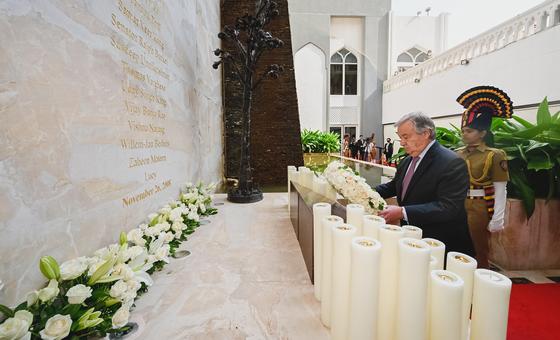India’s External Affairs Minister, Dr. Subrahmanyam Jaishankar, who chaired the meeting, invited participants to stand and observe a minute of silence for victims worldwide.
They include an Irish peacekeeper serving at the UN’s mission in Lebanon, UNIFIL, shot and killed in an attack the previous night. Three other blue helmets were also injured; one critically.
Widespread and prevalent
The global threat posed by terrorism not only requires the Council’s continued attention, but also a renewed collective approach, said Vladimir Voronkov, head of the UN Office on Counter Terrorism (UNOCT).
“Despite continuing leadership losses by Al-Qaida and Da’esh [also known as ISIL], terrorism in general has become more prevalent and more geographically widespread, affecting the lives of millions worldwide,” he reported.
Mr. Voronkov said these groups and their affiliates have continued to exploit instability, fragility and conflict, particularly in areas such as West Africa and the Sahel, where the situation remains urgent.
Their operations have also contributed to the deteriorating security situation in Central and Southern Africa, and elsewhere on the content.
Terrorist groups remain in Afghanistan, where they continue to pose serious threats to the region and beyond.
Xenophobic terror attacks rising
“Moreover, it is concerning that the de facto authorities have failed to sever long-standing ties with terrorist groups sheltering in the country, despite this Council’s demands that they do so,” he added.
Terrorists are “adapting opportunistically”, said Mr. Voronkov. They are resorting to illicit financing methods and other criminal activities, making it difficult to produce an coordinated international response.
He also expressed concern over a rise in terrorist attacks based on xenophobia, racism and other forms of intolerance, or in the name of religion or belief.
“While not a new phenomenon, a few Member States consider this as the fastest growing or even the most prominent domestic security threat that they face,” he said.
Pledge of support
Mr. Voronkov welcomed a special meeting of the UN Counter-Terrorism Committee (CTC), held last month in India, to review how terrorists are taking advantage of new and emerging technologies for their own illegal ends.
Discussions centred around three areas: the Internet, including social media platforms and related online spaces; countering terrorism financing and new payment technologies, and the misuse of unmanned aerial systems.
“The special meeting brought to the forefront overarching considerations of a ‘One-UN’ approach, upholding human rights, the role of civil society, and honouring the victims of terrorism,” said Weixiong Chen, acting chief of the Counter-Terrorism Executive Directorate (CTED).
“The Committee adopted the Delhi Declaration to reaffirm its commitment to work with Member States in achieving full implementation of all relevant Security Council resolutions to address the threats posed by terrorism,” he added.
Courage amid chaos
The CTC meeting was held over two days in Delhi and Mumbai, where terrorists carried out a series of bombing and shooting attacks 14 years ago, spanning four days. More than 30 people were killed, and scores more wounded.
Briefing the Council, Anjali Vijay Kulthe, a veteran staff nurse at the Cama and Albless Hospital in Mumbai, recalled that she was on night duty in the antenatal unit on 26 November 2008.
Two terrorists scaled the wall of the facility, which is exclusively dedicated to mothers and children. They entered the hospital, and she could hear shooting.
Ms. Kulthe was with two assistants at the time, and 20 women in advanced stages of pregnancy. Though riddled with fear, she guided everyone to safety. They sheltered in the hospital pantry, in darkness.
“I shiver even today as I recall the night of terrorist attack. While the terrorists were killing human beings like insects, I am happy that I was able to save the lives of 20 pregnant women and their unborn babies,” she said, speaking through an interpreter.
Appeal for action
A month later, the brave nurse was summoned to identify the lone surviving terrorist from the attacks. Although her family feared reprisals, she went ahead.
The terrorist, Ajmal Kasab, “did not have an iota of remorse, no shame, no guilt; his sense of victory haunts me even today,” she revealed.
“Whenever I see news reports on television about terrorist attacks anywhere in the world, my heart goes out for the victims, and survivors of such attacks who live the rest of their lives in trauma,” said Ms. Kulthe.
She urged the international to bring the sponsors of the Mumbai attacks to justice and give closure to the families of the victims.
Address root causes
Ireland’s Foreign Minister, Simon Coveney expressed his deep sadness and shock at the death of the country’s young peacekeeper in Lebanon, and the injuries to his colleagues.
“The incident and the loss of life is a stark reminder that our peacekeepers serve in dangerous circumstances, at all times, in the cause of peace,” he said.
Mr. Coveney told the Council that prevention is the most effective way to counter terrorism, which means tackling the complex and varied factors that drive it.
“We know that communities affected by conflict, poverty, inequality, poor governance, and human rights violations are more vulnerable to radicalisation and recruitment,” he said.
“Unless we address the root causes, we resign ourselves to addressing the same security challenges over and over again.”
At the end of the meeting, the Security Council issued a statement condemning terrorism in all its forms and manifestations.
The Council expressed condolences to the families of persons killed in terrorist acts, and underlined support for survivors and victims.
Members stressed the need to promote and protect the rights of victims of terrorism, including women and children, and reaffirmed their profound solidarity with them and with countries that have suffered terrorist attacks.

